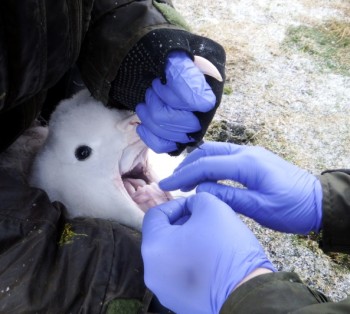Around 850 pairs of ACAP-listed and Vulnerable Wandering Albatross Diomedea exulans currently breed annually at Bird Island, South Georgia (Islas Georgias del Sur)*. Andy Wood of the British Antarctic Survey reports to ACAP Latest News of the recent harrowing experience of Jess Walkup, who is continuing the long-term monitoring of Wanderers on the island:
“During the monthly census in August, one wandering albatross chick was observed several metres from its nest, looking weak and uncharacteristically ruffled. Closer inspection revealed that it had more than two metres of monofilament fishing line emerging from its beak.
The line was wrapped tightly around the chick’s body and wings and had almost severed one leg. It must have ingested the hook and line embedded in discarded bait obtained by its parent while scavenging behind a fishing vessel. Indeed, a study published in 2010 suggested that 1300-2050 items of fishing gear are inadvertently consumed each year by wandering albatrosses at South Georgia. The team cut the bird free from the line, but had to leave the hook embedded within the bird’s digestive system. It was found dead a few days later.”

The hooked chick is examined, photograph by Cian Luck
The local South Georgia (Islas Georgias del Sur)* fishery is well managed and there is a ban on discarding hooks enforced by on-board observers. During the breeding season, Wandering Albatrosses range thousands of kilometres from the colony, overlapping with fisheries managed by many different regulatory regimes. The discarded fishing gear reported here is most likely to have come from a fishery that is much farther afield, where discarding of gear is not as well regulated. This emphasises the international nature of the problems that fisheries pose for this and other threatened ACAP species.
Selected Literature:
Phillips, R.A., Ridley, C., Reid, K., Pugh, P.J.A., Tuck, G.N. & Harrison, N. 2010. Ingestion of fishing gear and entanglements of seabirds: monitoring and implications for management. Biological Conservation 143: 501–512.
Andy Wood, British Antarctic Survey, Madingley Road, Cambridge, UK, 26 August 2014
*A dispute exists between the Governments of Argentina and the United Kingdom of Great Britain and Northern Ireland concerning sovereignty over the Falkland Islands (Islas Malvinas), South Georgia and the South Sandwich Islands (Islas Georgias del Sur y Islas Sandwich del Sur) and the surrounding maritime areas.

 English
English  Français
Français  Español
Español